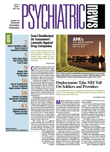In 1876 Dr. George Beard, a new york neurologist, presented a paper at the second annual meeting of the American Neurological Association (ANA) titled“ The Influence of Mind in the Causation and Cure of Disease.” His colleagues decried him.
Not at that meeting was Dr. J.J. Putnam, a Boston neurologist, one of the seven founders of the ANA and president of the organization in 1888. But a quarter of a century later, when past 60 years of age, Putnam was experimenting with Sigmund Freud's new method of psychoanalysis to better understand the symptoms of his patients. Included among these patients were some with mental disorders, such as neurasthenia, hysteria, traumatic neurosis, and obsession, which neurologists accepted as being within their orbit of practice.
In 1921 Sigmund Freud, in a preface to Putnam's book Addresses in Psychoanalysis, wrote that in America, “[Putnam] was able to do perhaps more than anyone for the spread of psychoanalysis and to protect it from aspersions.”
James Jackson Putnam was born into an eminent professional family in Boston. He received his medical degree from Harvard in 1866, spent a short period at the Massachusetts General Hospital (which his grandfather had helped establish), and then spent two years in Vienna, Leipzig, and London studying neurology under Meynert Rokitansky and Hughlings Jackson. On his return to Boston, he was named lecturer in nervous diseases at Harvard, established the first neurological clinic (of which he was chief from 1874 to 1904), and in time became professor of nervous diseases (from 1899 to 1912).
Putnam was one of a group of Boston physicians and psychologists, including William James, Morton Prince, and Adolf Meyer (during his Worcester days) who were interested in theories of the mind and concepts of consciousness, memory, disassociation, and the role of emotional factors in health and disease. Putnam attended the Clark university conference in 1909 at which Freud gave a series of lectures, and then spent three days at Putnam's summer camp in the Adirondacks. Thereafter, Freud and Putnam carried on an active correspondence until 1916, when World War I interfered with the mail delivery system. They also met on several occasions in Europe, and on one of those occasions, Putnam received six hours of psychoanalysis from Freud. Putnam devoted more of his practice to psychoanalysis and less to neurology.
Putnam accepted Freud's theories of bodily energy and the unconscious with its suppressed memories from which emerged symbolic symptoms. He differed with Freud in believing that philosophy and ethics were important in mental health functioning and in the social aspects of community influences, but these differences in beliefs did not impede the Freudian-Putnam relationship.
Freud was anxious to establish a firm footing for psychoanalysis in America and considered Putnam, whose reputation and integrity held great sway in professional circles, as the leader to do so. Dr. A.A. Brill had founded the New York Psychoanalysis Society in February 1911. The American Psychoanalytic Society was founded in May 1911 in Baltimore, with Putnam as its first president. The Boston Psychoanalytic Society was established a few years later, in 1914.
Many of Putnam's neurologist colleagues did not agree with his support of psychoanalysis. Dr. Bernard Sachs, a prominent new york neurologist (and ANA president in 1894 and 1932), wrote in his textbook of pediatric neurology that psychoanalysis was illogical and unsubstantiated in science. Dr. Frances Dercum, a professor of nervous and mental diseases at jefferson Medical College in Philadelphia (and ANA president in 1896) said in an address in 1911: “Psychoanalysis will probably never find a permanent place in therapeutics.”
Putnam published close to 50 papers on psychoanalysis, in addition to numerous papers on neurological subjects. ▪
